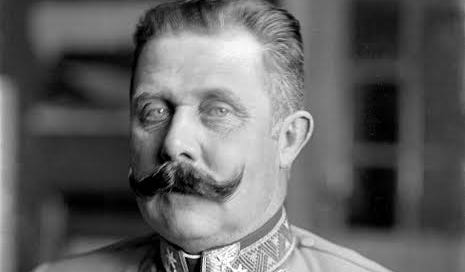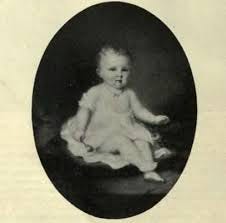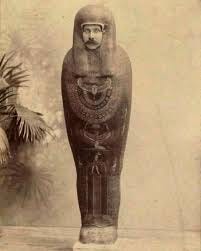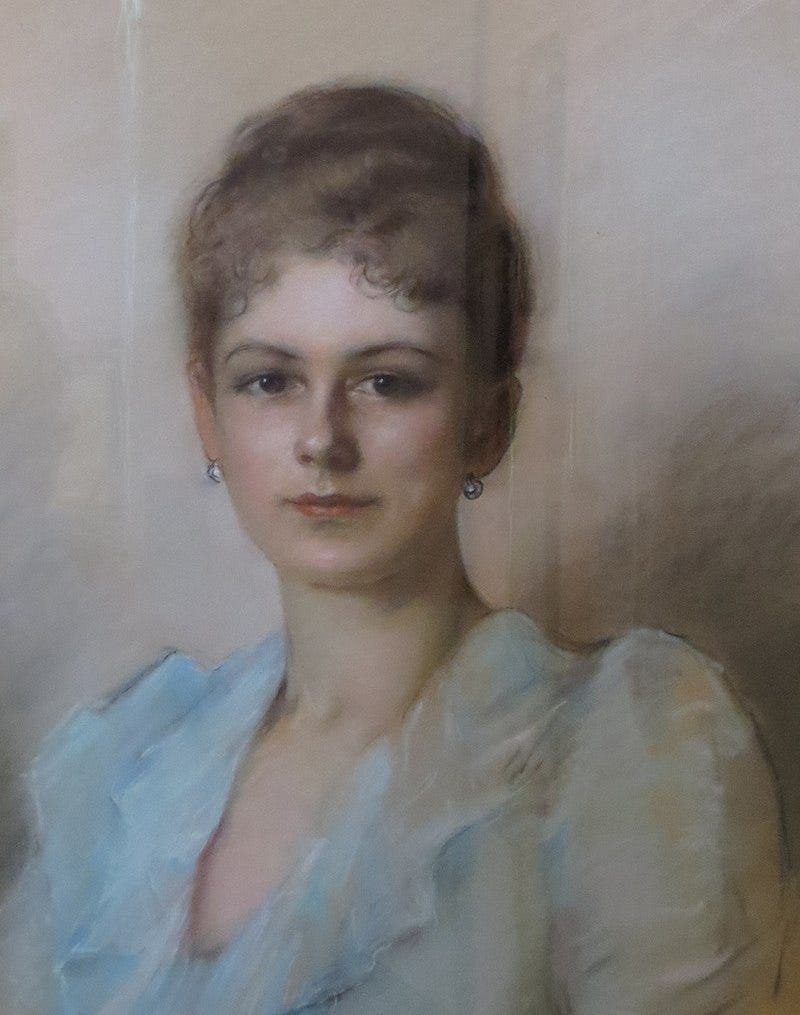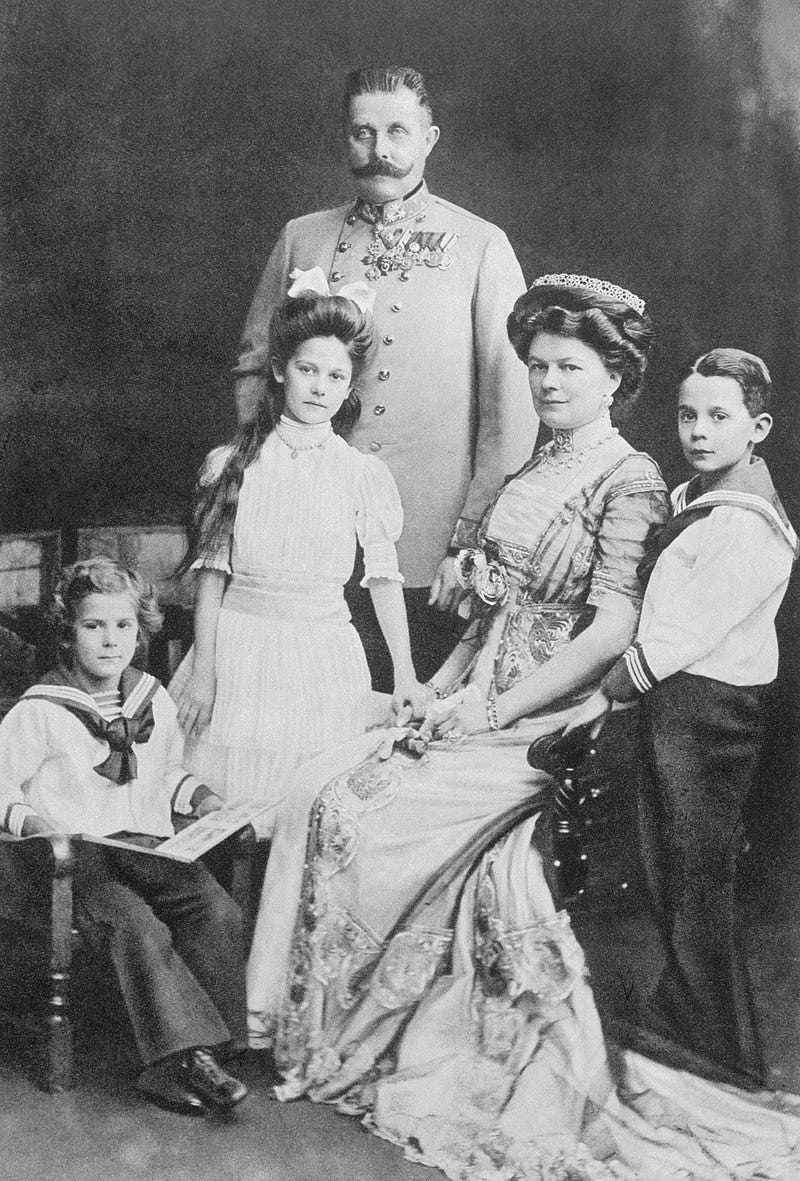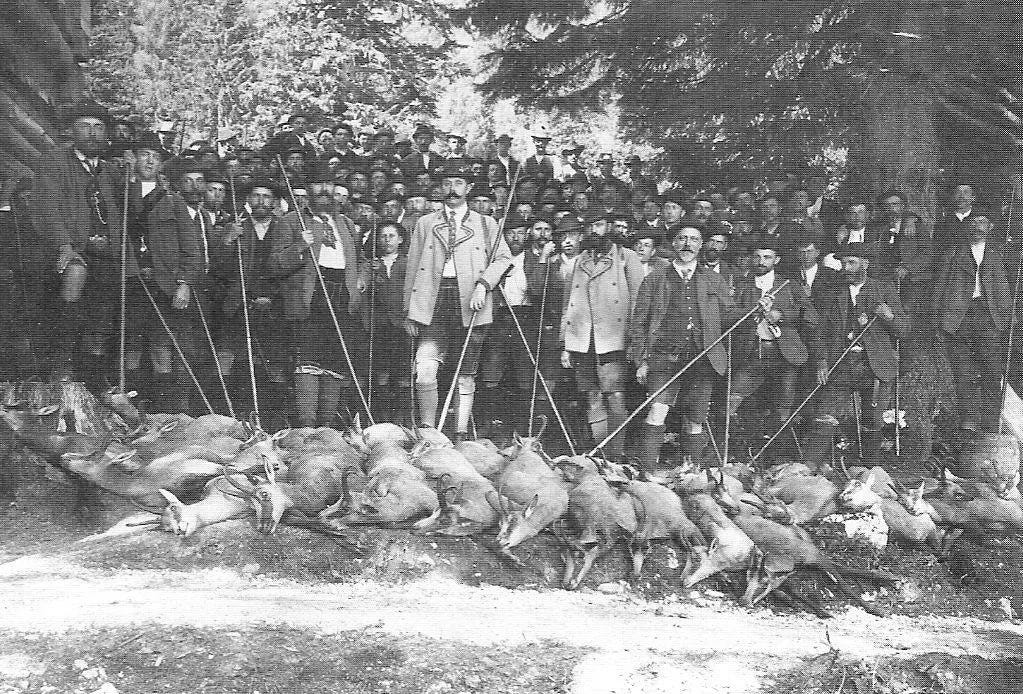Last time you saw me skulking around your inbox, it was because of my post looking back at the 2024 MLB season and my predictions. Click the link below if you missed it.
Today I’m going to start an occasional series looking at interesting people throughout history. For the first of these posts I will look at the life of Archduke Franz Ferdinand of the Austro-Hungarian Empire (1863-1914). I’m sure most of you know that it was his assassination that sparked World War I, but there is a much deeper and more interesting story here. Your email might not display the whole post. If that is the case, just click on the title and read it on the app or website in its entirety.
History of the Austrian Empire
To properly examine the life of Franz Ferdinand, we need to look at the history of the Austrian royal family in the early and mid-19th century the years prior to Franz Ferdinand’s arrival on the scene.
In 1792 Austria was ruled by Francis II, who was also Holy Roman Emperor. In response to Napoleon crowning himself emperor of the French earlier that year, on August 11, 1804, Francis announced that he would henceforth assume the title of hereditary emperor of Austria as Francis I, essentially abdicating his role as Holy Roman Emperor. This move was technically illegal in terms of imperial law, yet it had been agreed to beforehand by Napoleon and therefore took effect. Two years later, in July 1806, under massive pressure from France, Bavaria and fifteen other German states Francis bowed to the inevitable and formally dissolved the Holy Roman Empire.1
He was married four times, the most important, for our purposes, was to Empress Maria Teresa of the Two Sicilies, who he married in 1790. She gave birth to a son, Ferdinand, who would become Emperor on the death of his father in 1835.
Because of the repeated inbreeding of the Habsburgs (Ferdinand's parents were double first cousins. They shared both sets of grandparents), Ferdinand had been born with severe epilepsy. His father was concerned enough to include in his will a clause stating that Ferdinand should consult his uncle, Archduke Louis on all aspects of internal policy. He also urged him to take the council of Austrian Foreign Minister, Prince Metternich, which Ferdinand was followed. He was not very interested in ruling the empire and known by his people as Ferdinand The Benign.
Ferdinand married Maria Anna of Savoy, but had no children. When a revolution began in Austria, in 1848 he was convinced by Archduke Louis, to abdicate in favor of his nephew, Franz Joseph. Next line in should have been Ferdinand's younger brother Franz Karl, but Franz Karl was persuaded by his wife Sophie to renounce his succession rights in favor of Franz Joseph.
In 1848 when Franz Joseph became emperor he had two brothers, Ferdinand Maximilian Josef who was born July 6, 1832 and Franz Karl Joseph born on July 30, 1833 and they would be next in line if Franz Joseph had no children. However, in 1854, Franz Joseph married Duchess Elisabeth Amalie Eugenie of Bavaria (known as Sisi). In 1855 and 1856 Sisi gave birth to daughters, Sophie and Gisela. Franz Joseph and the rest of the court, including Sisi’s mother were becoming increasingly nervous about the chances of a male heir, but on August 21, 1858 a son, Rodolph Franz Karl Joseph, was born and everyone was able to relax.
Franz Ferdinand and his early life
Archduke Franz Ferdinand Karl Ludwig Joseph Maria of Austria was born in the city of Graz, Austria (also home to Arnold Schwarzenegger) on December 18, 1863 to Archduke Karl Ludwig Josef Maria of Austria and his second wife Princess Maria Annunciata Isabella Filomena Sebasia of Bourbon and the Two Sicilies2. He was the eldest of the couple’s four children three sons (Franz Ferdinand, Otto Franz Joseph and Ferdinand Karl), and a daughter (Margarete Sophie).
There was little chance that Karl Ludwig would ever be on the throne, with Rudolph as Heir Apparent and Maximilian ahead of him for the crown, and an even smaller chance that Franz Ferdinand would ever be emperor. He was treated as just another archduke, private tutors at the palace, and an early entry into the Austrian military with a meteoric rise through the ranks (i.e. Lieutenant at 20, Colonel at 25, General at 33).
Becoming heir
In 1889, Franz Ferdinand's life changed dramatically. His cousin, and the only son of Emperor Franz Joseph, Crown Prince Rudolf, shot himself after killing his 17-year-old mistress at his hunting lodge south of Vienna, in a murder suicide pact.3 The bullet Rudolf put into his brain, ended Franz Joseph’s line, extinguishing his only male heir and lead to a crisis of succession. The title of Heir Presumptive should have passed to the Emperor’s brother Maximilian. However, Maximilian had been executed by by Mexican nationalists in June of 1867, while ruling as Emperor of Mexico.4 That left Karl Ludwig as the Heir Presumptive and Franz Ferdinand next in line. However, Karl Ludwig quickly he abdicated his claim. Franz Joseph would not except this and was constantly trying to bully his brother into resuming his position. Franz Joseph was also less than pleased to have Franz Ferdinand in line to inherit the Austo-Hungarian throne. He believed his nephew to be weak and lacking in both education and ambition, possessing ridiculous ideas. For Franz Joseph, it was like being forced to drink a glass of freshly brewed disappointment.
If Franz Joseph was less than welcoming to the future heir, there were a number of eligible young princesses and their mothers, all over Europe, who were not. Princess Mathilde of Saxony was suggested, and quickly rejected by Franz. After a visit to the British court in 1894, Franz Ferdinand wrote to a family friend, Countess Marie Thun-Hohenstein, that he was relentlessly pursued.
“the designated fiancées moved about in a great herd and showed worrisome levels of persistence. I sat next to one of the lionesses on the prowl, and she was all good manners and appropriate conversation but there was nothing in her head but air.”
Franz Ferdinand was not looking for womb with legs or someone to strengthen his political position, nor did he want to replicate the mistakes made by Franz Joseph and Rudolf. He wanted to marry someone like his stepmother5 – good, kind, supportive, intelligent, someone whom he actually loved. He knew himself well enough by now to know the personality of the wife he needed to help him become a good Emperor and he lamented:
“she should not be too young and her character and views should be fully mature and she should be able to stand on her own two feet during a difficult discussion Unfortunately I know of no such princess”
In 1894, at a ball in Vienna, Franz Ferdinand met Countess Sophie Maria Josephine Albina Chotek von Chotkova und Wognin, a lady-in-waiting to Archduchess Isabella, wife of Archduke Friedrich, Duke of Teschen. Franz soon began visiting Archduke Friedrich’s villa, in what is now Bratislava. Archduchess Isabella was overjoyed on believed the purpose of these visits to woo her eldest daughter, Archduchess Maria Christina, (who was 15, Franz was 31 at the time), but it was Sophie Chotek he had fallen in love with her.
In 1895, just as Franz Ferdinand was gaining confidence and an understanding of his new role, along with a budding romance, fate dealt him a cruel blow. He developed tuberculosis, the dread disease that had killed his mother. There was only one solution. He was put under the supervision of a TB specialist and sent to recuperate in climates warmer and less polluted than Vienna. He visited the Tyrol, the south of France and Egypt in an attempt to recover from the illness that killed many people in the 19th century. Franz Joseph used the disease as an excuse to try to marginalize Franz Ferdinand even further, say that it made him unfit to rule, since he could die at any time.
During his convalescence, Sophie wrote to Franz Ferdinand nearly every day, discussing a wide range of topics from personal issues, to their thoughts on Austro-Hungarian foreign policy. They kept their relationship a secret from everyone, because Sophie was not considered a suitable spouse for Franz. During this time Franz was forced to spend hours and hours just resting, but it worked. He recovered completely although it took most of two years, a miserable and frustrating two years, considering what was going on in Vienna.
Back in Vienna, Franz Ferdinand’s younger brother Otto had not hesitated to step into his shoes. He was another Rudolf – popular, charming, unhappily married and a victim of venereal disease. Prince Alfred Montenuovo, the Lord High Chamberlain and the Foreign Minister, Count Agenor Goluchowski, supported Otto over Ferdinand as the next heir. Otto started carrying out official duties in the Emperor’s name. He was given a palace to live in, while Franz Ferdinand just had a suite of rooms at the emperor's palace, the Hofburg. It was Otto, not Franz Ferdinand who entertained the Russian Imperial couple on their official visit to the court. To Countess Marie, Franz Ferdinand wrote,
“I am deeply wounded and angry at being treated, although I am still alive, as if I’m past my expiration date.”
And yet Franz Ferdinand was nearer than ever to the throne. On May 29, 1896, his father, and Heir Presumptive died of typhoid. Now Franz Ferdinand was officially the heir. Emperor Franz Joseph did not like his nephew and couldn't stand the sight of him. Every time the emperor looked at Franz Ferdinand, he saw his dead son and the failure of his line. By 1897, Franz Ferdinand was back at court and trying to reestablish himself. He was made Colonel-in-Chief of the 7th Regiment of Uhlans. He was sent, as Austria’s representative, to the celebrations of Queen Victoria’s Diamond Jubilee. An imperial edict of 1898 made it possible for Franz Ferdinand to undertake some duties on behalf of the High Command, in order to become better acquainted with the armed forces of the Empire. He would also be granted access to high-level meetings and military planning sessions.
Franz Ferdinand and his battle for love
In the late 1890s, Franz Ferdinand was still visiting the estate of Pressburg, home to Archduke Friedrich and Archduchess Isabella, she was holding out hope that Franz Ferdinand would marry at least one of her four daughters. This was not to be, in April 1899, Franz Ferdinand left his pocket watch behind after a tennis party at Pressburg. A servant handed it to Isabella and noticing a locket attached to the chain, she opened it. She hoped to see a picture of one of her daughters, but it was Sophie Chotek’s photo that was inside.
Isabella flew into action, Sophie was dismissed from her service and in a rage, Isabella went to Emperor Franz Joseph demanding action. The Habsburg court was very particular about who a member of the family could marry, it was restricted to any Catholic royals in the first section of the Almanach de Gotha6, leading to many Habsburgs intermarrying with cousins (Franz Joseph and Sissi were first cousins for example), and there were many consequent genetic problems and miserable relationships. Franz Ferdinand had an antidote to this because he had fallen in love with a lady-in-waiting, someone outside the cloistered Habsburg family. Sophie was not a normal lady-in-waiting, she was a Bohemian Countess, the daughter of the Austro-Hungarian Ambassador to Belgium, but that was not good enough for Franz Joseph and the rest of the Habsburg royals.
After the meeting with the incensed Isabela, Franz Joseph took action, he demanded his nephew renounce the Countess and continue the search for a suitable bride. Franz Ferdinand flatly and loudly refused. Months of wrangling followed, with Franz Ferdinand’s only support from inside the family, coming from his stepmother, Maria Theresa, and Rudolf’s unhappy widow, Stephanie. Franz Ferdinand enlisted the assistance of Pope Leo XIII, Czar Nicholas II and even Kaiser Wilhelm II, to twist the emperor’s arm. Eventually, a compromise was reached, Franz Ferdinand had to agree to a morganatic marriage.7 On June 28, 1899, he swore an oath that Sophie would never be Empress, hold any equal rank or social standing, and his children would never be able to “lay claim to the rights, honors, titles, coats of arms, or privileges of their father”, rights that other Habsburg children would acquire from their parents.
The wedding took place on 1 July 1900, far from Vienna at Reichstadt castle in Bohemia. Franz Joseph did not attend the ceremony, nor did Franz Ferdinand's brothers or any other Habsburg archduke. The only members of the imperial family present were Franz Ferdinand's stepmother, Princess Maria Theresa and her two daughters. Sophie was given the title "Princess of Hohenberg". In 1909, she was given the more senior title "Duchess of Hohenberg". This raised her status considerably, but she was still required to yield precedence at court to all the archduchesses. This arrangement was deeply insulting to Ferdinand, and he laid the blame for this directly at the feet of Isabella and his uncle.
There is no doubt that his marriage was the best thing to happen to Franz Ferdinand. By 1904 Franz and Sophie had three children, (Sophie Marie Franziska born 1901, Maximilian Karl Franz born 1902 and Ernst Alfons Franz born 1904), Franz Ferdinand showed very little warmth to anyone but his wife and three children. In a letter to his stepmother, Archduchess Maria Theresa, after the birth of his second son in 1904, Franz Ferdinand writes:
By far the cleverest thing I ever did in my life was to marry my Sophie. She is everything for me: my wife, my doctor, my advisor — in a word my whole happiness. Soph is a treasure and I am indescribably happy! She takes such good care of me, I feel as though reborn. Then there are our children! They are my whole pride and joy. I sit with them all day long in amazement that I can love them so much. And then the evenings at home when I smoke my cigar and read my papers. Sophie knits and the children tumble about, knocking everything off the tables. It’s all so cozy and precious.
Unfortunately, Sophie was condemned to a twilight world where she could appear at court but was unable to accompany her husband due to her lowly status. She could not enter a room on his arm, she could not sit next to him at dinner, she could not take part in any State functions, or even sit in the royal box at the Ballet, opera or symphony. Because of this intolerable situation, Franz Ferdinand and Sophie stayed away from court as much as possible.8 Unfortunately, his absences diminished his influence and kept him out of the public light.
Protocol was a real issue at the Austrian court but so was the Emperor’s age, (he was 70 in 1900 when European life expectancy was 43), and his entrenched positions. If Vienna could not recognize that it needed to look to the future, the rest of Europe did. The rest of Europe was rather more open minded as well, for example, in the United Kingdom, the Duke of York was married to a mere Countess as well. Franz Ferdinand found that no matter how badly he was treated in Vienna, he was of significant enough importance to be honored by other rulers. It started in 1903 with the Kaiser arriving on a state visit. Bernhard von Bülow, his chancellor, advised Wilhelm that if he paid attention to Sophie, he would win the friendship of Franz Ferdinand for life. The Kaiser was skeptical of the idea, but when he was greeted by Franz Ferdinand at the railway station in Vienna, he asked when he would be able to meet Sophie. They all had tea together later that day. Sophie and Franz Ferdinand were later invited to visit the court in Berlin where she received all the honors due to an heir’s wife. In 1909, they were both invited to Romania by King Carol I and in 1913, there was a visit to the above mentioned Duke of York who was now King George V. These visits were mainly considered private, or at least semi-official and became known as Franz Ferdinand’s “shooting box diplomacy” as all visits involved some kind of shooting outing. Through these visits Franz Ferdinand established diplomatic relationships abroad for himself and his country.
Franz Ferdinand behind the scenes
Franz Ferdinand was an ill-tempered, outspoken, headstrong man in public, but quite different at home, as we have seen. Besides Sophie and his children, Franz Ferdinand enjoyed three things; travelling, gardening and game shooting. He traveled extensively, especially before his marriage. Between 1892 and 1893 he completed a circumnavigation of the world. He visited Turkey, Saudi Arabia, India, Australia, New Zealand, New Caledonia and New Guinea. He stopped at the New Hebrides and Solomon Islands before travelling to Hong Kong and Japan. After crossing the Pacific Ocean from Yokohama to Vancouver, Canada, he crossed the United States on the Chicago, Burlington and Quincy Railroad arriving in Chicago for the World’s Columbian Exposition in 1893, which he thoroughly enjoyed. He also stopped in New York before returning to Europe and the burdens of real life. His travels once he was married were more to allow Sophie to enjoy the trappings of the station she was denied at home.
The Archduke was a great lover of flowers and gardens as well. In 1889, Franz Ferdinand rebuilt his estate at Artstetten Castle, adding a formal garden to the west of the castle and extending the park. The garden architect Jiri Molnar designed the formal garden based on the Archduke's ideas and included a chestnut avenue and two fountains. At the time it was the largest garden in Europe. At his residence of Konopischt thousands of rose beds stretched out in a maze-like pattern over the grounds of his favorite home. He had transformed the former baroque garden into a landscape park with a rose garden and greenhouses. Guests often lost their way in the great floral mosaic of roses. He was actually known among the people of the empire as the Floral Emperor. His daughter Sophie recalled that her father seemed happiest when he was studying flowers and pressing them into his books.
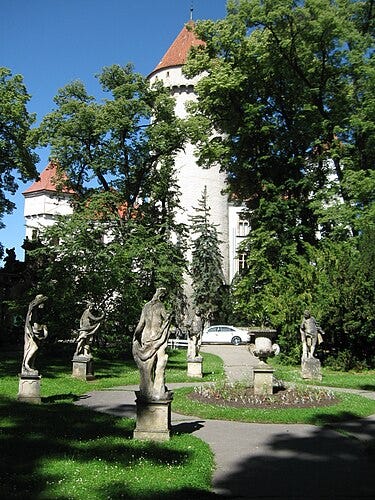

Then there was his game shooting, some would say that Franz Ferdinand was trigger-happy. Others, like Emperor Franz Joseph described his nephew’s hobby as mass murder, while still others considered it a mania. Tigers in India, kangaroos, emus and wallabies in Australia and stag and does in the forests of Austria all met their demise at the end of the archduke’s rifle.
Franz Ferdinand tallied his kills in a massive journal. According to the journal, the grand total of birds, ground game and deer that he shot was 272,511. Hunting trophies, 100,000 of them, cluttered his estate at Konopischt. Visitors had to be careful walking down the halls to avoid getting impaled by antlers. At the estate he had the foot of a giant elephant, shot by the Archduke in Kalawana, India in 1893, as an ashtray, and the foot of another such colossus from Ceylon (modern day Sri Lanka) as a wastepaper basket. He was ready to shoot anything that moved. On his trip to Great Britain, he and King George V reportedly killed 2,140 pheasants and grouse in a single day.
Franz Ferdinand in the political realm
Franz Ferdinand was well aware that his early education had been somewhat lacking compared to what it should have been as the heir to the Astro-Hungarian crown. He quickly set out to remedy that, taking private lesson from military leaders and political experts. As Franz Ferdinand’s knowledge and confidence in his position grew, he pressed the emperor to modernize the archaic rules that he believed were slowly killing the empire. Emperor Franz Joseph, on the other hand, preferred a more tranquil regiment. His motto was essentially “do nothing and hope for the best” He was old and lethargic, and often spent 14 hours a day at his desk buried in bureaucratic matters. The archduke’s demands, like modernizing the navy, retiring long-time military chiefs, and forming alliances with the Russian Empire, in addition to Franz Ferdinand’s mercurial personality, irritated Franz Joseph. The comfortable ways of Franz Joseph were leading the empire to the grave, and things had to be shaken up.
Franz Ferdinand began the shake up by setting up a shadow foreign ministry at Belvedere Palace his official residence in Vienna. It was headed by Major Alexander Brosch and was intended to develop policies that Franz Ferdinand would implement when he became Emperor. Many saw it as a rival to the government of Franz Joseph but it was more akin to Franz Ferdinand working towards a masters in Imperial Studies. As his knowledge progressed Franz Joseph allowed him to see more official documents and occasionally actually give his opinion on a unimportant policy. However, Brosch had a much higher regard for the views of Franz Ferdinand. He stated, “The Archduke is highly gifted; he has a really incredible quickness of perception and a sure eye, especially for military conditions”. Franz Ferdinand wrote in his notes that once he became emperor he would introduce universal suffrage, a.k.a. one-man, one-vote, but not for the reasons you may assume. Franz Ferdinand was no friend to democracy. What he was interested in was weakening Hungarian power. He believed it was that power that was the barrier to change. He believed that the only way to hold the empire together was to give the ethnic minorities more political power and the Hungarian bureaucracy would never allow that. Greater rights for south Slavs, Czechs and other subjugated ethnicities on the Hungarian side of the empire, would undermine their political power, and consolidate that power in Vienna, allowing Franz Ferdinand to make the changes needed to keep the empire intact
Franz Ferdinand’s most astute act in the years prior to 1914, was his opposition to the ideas of Franz Conrad von Hötzendorf, Franz Joseph’s Chief of Staff. von Hötzendorf was determined to wage war on Serbia, especially after Belgrade opposed Austria’s annexation of Bosnia-Herzegovina in 1908. Every few months, he would suggest it, and every few months Franz Ferdinand would vehemently argue against it. The Archduke understood the bigger picture; if Austria went to war with Serbia, Russia would rush to support its Slav brothers, and declare war on Austria. Then the treaties tying Europe together would create a pan-European war that would probably lead to the downfall of the Habsburg monarchy and others as well. If only Franz Ferdinand’s warnings had been remembered in July 1914.
By June 1914, Franz Ferdinand had been made Inspector-General of the Armed Forces. He was delighted by this, it was a hugely important recognition of his position and hard work. As Inspector-General, he was expected to go to Sarajevo to observe the military maneuvers in the hills above the city. It was just a military occasion until the Governor General, Oskar Potiorek, decided it would be a feather in his cap to ask the Archduke and his wife to visit the city itself. Franz Ferdinand knew Sarajevo was politically unstable, and was not happy about an official appearance, so only a short, half day visit was agreed upon for June 28th. One of the main reasons Franz Ferdinand agreed to this visit was Sophie would be allowed full royal honors for the first time.
This is not the place to tell the story of the fateful day that Franz Ferdinand and Sophie were assassinated but it has to be noted that it might not have been so tragic had there been proper security arrangements. For a start, Potiorek had not warned Franz Ferdinand that June 28, was St Vitus day, the Serb national holiday marking the 1389 Battle of Kosovo which ended in their bloody defeat by the Ottoman Empire but also a day that was celebrated for the assassination of the Ottoman Sultan.9 Potiorek also declared his police force would be able to cope with the visit, even though half that police force was on a day off as it was a Sunday, totally ignoring the 22,000 soldiers exercising nearby who would have been able to assist with security. Potiorek was warned by his own officials and by Austrian ones including the Foreign Office, the Ministry of the Interior and Austrian military intelligence, that there was a definite threat to the Archduke. He ignored these warnings because he was supremely confident in his security arrangements. The Austrian government itself did nothing to supervise the security arrangements Potiorek made because nobody cared enough about Franz Ferdinand to act on his behalf. By contrast the security setup for a trip by Franz Joseph to Sarajevo in 1910 had been absolutely oppressive. 30,000 Austrian Army troops had totally sealed off the city and there were roving patrols as well as four soldiers on every street corner. Had those measures been in place on June 28, there is a strong likelihood the assassination would not have happened and the course of history would have been vastly different.
I hope you have found the life of Franz Ferdinand interesting. We all knew that it was his assassination that sparked World War I, but I hope this post has completed the picture of a man who was a flawed but loving husband and father. I hope that after reading this you have at least a little sympathy for the man that should have never been in the position that led to his death. As always please share this post with anyone who might be interested. Next time we meet I’ll be back on one of my favorite topics; baseball. Specifically way the Baseball Writers Association of America and their flawed and suspect voting for membership in the Baseball Hall of Fame needs to be reformed or scrapped all together.
Chris
Germany was unified on January 18, 1871. Before that there were 39 different German states.
The House of Bourbon and the Two Sicilies is a branch of the House of Bourbon that ruled Southern Italy and Sicily for more than a century in the 18th and 19th centuries. The name of the Kingdom of the Two Sicilies came from the unification of the Kingdom of Sicily with the Kingdom of Naples (called the kingdom of peninsular Sicily), by King Alfonso V of Aragon in 1442.
The circumstances surrounding this incident are very interesting and extremely complicated. They involve statutory tape and venereal disease. If you would like to read more here is the link to the Wikipedia page. I would recommend looking at it, it’s bonkers.
The story of how Maximilian became emperor in Mexico is long and complicated. It involves Mexico, France, Spain, Great Britain and the United States. Let’s just say that the crown of Mexico came at a high cost to Maximilian. Although he had extracted promises from Napoleon III to militarily support the regime, he was to be entirely dependent on him. Emperor Franz Joseph (he was a real jerk), forced him to renounce any rights to the Austrian throne or as an archduke of Austria. On April 9, 1864 Maximilian reluctantly agreed to the "Family Pact" and formally accepted the crown of Mexico on April 10, 1864.
After a long series of events, Maximilian was captured by forces of the deposed Mexican president and put on trial. After a one day trial he was sentenced to death. The sentence was carried out at 6:40 am on June 19, 1867, when Maximilian and two loyal generals were executed by firing squad. He gave each of his executioners a gold coin in traditional European aristocratic fashion. His last words spoken only in Spanish were, "I forgive everyone, and I ask everyone to forgive me. May my blood which is about to be spilled end the bloodshed which has been experienced in my new motherland. Long live Mexico! Long live its independence!" If you want to learn more here is the link to the Wikipedia page.
After the death of Franz Ferdinand’s mother, his father married Infanta Maria Theresa of Portugal on 23 July 1873. She became stepmother to his children, and was by all accounts dotted on them. Maria Theresa managed to obtain considerable influence at the Austrian court when Empress Elisabeth effectively withdrew from the social scene in Vienna after the suicide of Rudolf, in January 1889. Maria Theresa stood in for the Empress and carried out honors at the Hofburg Imperial Palace with the Emperor until the death of her husband in 1896 when court etiquette ruled she had to go into retirement. She remained such an influential figure behind the scenes at court She offered encouragement and support to her stepson Franz Ferdinand in his determination to marry Countess Sophie Chotek against his family's will. She traveled to a convent in Prague herself to fetch Sophie and took her into her own house, even pleading on Sophie's behalf with the Emperor Franz Joseph. After the union was finally permitted, Maria Theresa made all the arrangements for the wedding, insisting that it take place in her own private chapel. She remained close to Franz Ferdinand and Sophie until their assassination. She was the one who broke the news of their parents deaths to the children. She also ensured the children's financial security after telling the Emperor (still a real jerk) that if he did not grant them a yearly income, she would send the allowance which she drew as a widow to them. (All of Franz Ferdinand's fortune and property went to his nephew the Archduke Charles).
The Almanach de Gotha is a directory of Europe's royalty and higher nobility. It also included the major governmental, military, diplomatic members. It was first published in 1763 in Gotha, Germany for the court of Frederick III, Duke of Saxe-Gotha-Altenburg. It came to be regarded as the authority on the classification and genealogical, biographical and details of Europe's highest level of aristocracy.
Morganatic marriage, sometimes called a left-handed marriage, is a marriage between people of unequal social rank, which in the context of royalty or other inherited titles, prevents the royal’s position or privileges being passed to the spouse, or any children born of the marriage. The concept is most prevalent in German-speaking territories.
Even in death and lying in state in Vienna, Sophie Chotek remained an inferior member of the Habsburgs. At first, the Court chamberlain, Prince Montenuovo, decided that the duchess' casket would not be permitted to be placed next to that of Franz Ferdinand. Only the personal intervention of the Emperor Franz Joseph himself made it possible for her to lie next to her husband in the imperial chapel, but her coffin was set a foot lower than that of Franz Ferdinand, and with far less decoration. Some historians have suggested that the fact that Franz Ferdinand and Sophie did not receive a grand state funeral in Vienna made it impossible for the European heads of state to meet in an informal summit conference that might still have averted a major war.
During the battle a party of twelve Serbian lords slashed their way through the Ottoman lines defending Murad I. One of them, Milos Obilic, managed to get through to the Sultan's tent and kill him.

